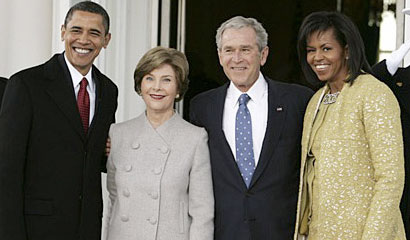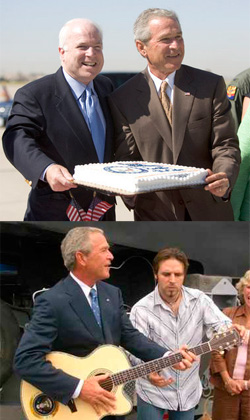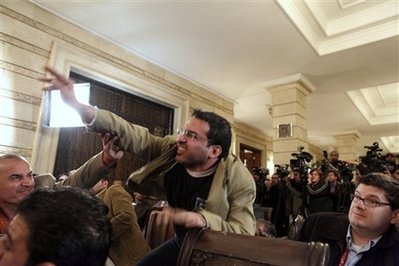Romney and Character
Romney, as it turns out, was a bully as a teenager:
John Lauber, a soft-spoken new student one year behind Romney, was perpetually teased for his nonconformity and presumed homosexuality. Now he was walking around the all-boys school with bleached-blond hair that draped over one eye, and Romney wasn’t having it.
“He can’t look like that. That’s wrong. Just look at him!” an incensed Romney told Matthew Friedemann, his close friend in the Stevens Hall dorm, according to Friedemann’s recollection. Mitt, the teenage son of Michigan Gov. George Romney, kept complaining about Lauber’s look, Friedemann recalled.
A few days later, Friedemann entered Stevens Hall off the school’s collegiate quad to find Romney marching out of his own room ahead of a prep school posse shouting about their plan to cut Lauber’s hair. Friedemann followed them to a nearby room where they came upon Lauber, tackled him and pinned him to the ground. As Lauber, his eyes filling with tears, screamed for help, Romney repeatedly clipped his hair with a pair of scissors. …
“It happened very quickly, and to this day it troubles me,” said Buford, the school’s wrestling champion, who said he joined Romney in restraining Lauber. Buford subsequently apologized to Lauber, who was “terrified,” he said. “What a senseless, stupid, idiotic thing to do.”
“It was a hack job,” recalled Maxwell, a childhood friend of Romney who was in the dorm room when the incident occurred. “It was vicious.”
The bullying, and his reaction to it now, are somewhat reminiscent of another recent president, George W. Bush, who branded pledges with a red-hot coat hanger and defended it as being no worse than a “cigarette burn.” (A few reminders here, here, here, and here.)
Romney’s “youthful indiscretions,” however, go somewhat beyond that–leading a gang of youths who chased and tackled a kid, pinned him to the ground, and hacked off his hair while the kid screamed for help–for no better reason than that the kid was different.
Now, people change. People who were bullies as teens often mature and become better people. However, sometimes they only evolve into a different kind of person with the same basic disregard for other people. Like Dubya, sometimes they just get better at masking it.
What would have impressed me would have been if Romney had sat down and given a heartfelt expression of remorse. He could have told about how, when you are found and want to be liked by your peers, you do stuff that you regret later in life. That would not have been damaging to him–quite the opposite. It could have been an extremely human moment, respected by everyone, not to mention a teachable moment, helpful to many teens who might be doing wrong but could be steered right. It would be the kind of thing somebody like me, a person strongly opposed to Romney politically, could have said, “I may not like his policies, but I really respect what he did there.”
So, what did Romney say about violently assaulting a kid for being different?
“I’ll tell you,” Romney said, chuckling, “the thought that that fellow was homosexual was the furthest thing from our minds back in the 1960s, so that was not the case. But as to pranks that were played back then, I don’t remember them all, but again, high school days, I did stupid things. … And if anyone was hurt by that or offended, obviously I apologize for that.”
Holy crap. Really. My first thought is, this was just one of so many similar “pranks” that he can’t even remember what happened? What else did he do? How many other people did he assault? I mean, seriously, if he cannot remember chasing down and shearing a kid’s hair off while the kid screamed, that’s pretty goddamned significant.
It raises serious questions about his conscience, and shines a clearer light on how he could be proud of the work he did later on at Bain Capital, destroying companies and jobs for profit. What kind of person does even that one thing to that kid–or, as Romney himself admitted, many acts of bullying (excuse me, “pranks”)–that he can’t even remember something so chilling? The incident was so vicious that not only do the other people in his “posse” remember it vividly, but even bystanders, half a century later, have powerful recollections of it.
But then there’s his cavalier attitude toward it today, calling such a thing a “prank”–were I that guy he pinned down and cut the hair off of, I would be livid right now. (Sadly, he passed away years ago.) Worse, Romney said, “if anyone was hurt by that or offended, obviously I apologize for that.” “If”?? Really? You chase a kid down, pin him to the ground, and hack off his hair while he screams for help, and you’re still not sure if he was hurt or offended?
Like I said, holy crap.
Yes, In know–it was not his “human” answer, but his “politician” answer. Trying to minimize damage by apologizing and yet not admitting to any wrongdoing. Perhaps it only demonstrates that he’s a piss-poor, tone-deaf politician.
His campaign is also trying to minimize the story instead of dealing with it in a human manner:
“The stories of fifty years ago seem exaggerated and off base and Governor Romney has no memory of participating in these incidents.”
“Off base”? What is that supposed to mean? And exactly how can they know the stories are exaggerated if Romney says he cannot remember them? How can you both claim that a story is inaccurate and you don’t know anything about it?
A man who witnessed the incident seemed to remember it just fine–not to mention, had the appropriate response, years later:
Sometime in the mid-1990s, David Seed noticed a familiar face at the end of a bar at Chicago O’Hare International Airport.
“Hey, you’re John Lauber,” Seed recalled saying at the start of a brief conversation. Seed, also among those who witnessed the Romney-led incident, had gone on to a career as a teacher and principal. Now he had something to get off his chest.
“I’m sorry that I didn’t do more to help in the situation,” he said.
Lauber paused, then responded, “It was horrible.” He went on to explain how frightened he was during the incident, and acknowledged to Seed, “It’s something I have thought about a lot since then.”
Romney denies the attack on Lauber had anything to do with his assumed gender identity, but was known for similar attitudes toward other students–sadly, an attitude apparently encouraged by the school:
But Friedemann and several people closest to Romney in those formative years say there was a sharp edge to him. In an English class, Gary Hummel, who was a closeted gay student at the time, recalled that his efforts to speak out in class were punctuated with Romney shouting, “Atta girl!” In the culture of that time and place, that was not entirely out of the norm. Hummel recalled some teachers using similar language.
One could argue that Romney was simply a product of his environment and his time, and this may be true. It is certain that he has matured and would no longer look kindly on exactly these actions. But there does remain the question of whether he has evolved into someone who does look kindly on adult versions of the same kind of attitude. A disregard for those who are different, a lack of compassion for people in need, a disposition to confirm to the behavior of those in his environment rather than to work from an individual moral base.
People around him are talking about what a swell guy he is. But this means very little–remember, Dubya was described in the same way–in light of the fact that people with serious deficits in morality can easily present themselves as good ol’ boys.
Even more significantly, there is the realization few people understand, which is that most forms of discrimination and harm come from people who not only act decently most of the time, but who sincerely believe themselves to be moral people incapable of such things. Most racism today comes from such sources, as do most of the injustices, some large but the majority small, that happen in the world today.
One must judge people on their actions, not the image they project. Romney’s origins speak somewhat to his moral foundation, but his current casual disregard for the terrorizing he did as a young man speaks far louder.


 Bush was asked at his final press conference if he had made any mistakes and if so, what was the biggest. While Bush did not repeat the “I can’t think of any” boner, one could say that he did much worse. One part of his answer:
Bush was asked at his final press conference if he had made any mistakes and if so, what was the biggest. While Bush did not repeat the “I can’t think of any” boner, one could say that he did much worse. One part of his answer: But note his lament after this nugget of hindsight, that landing Air Force One (had it even been possible) would have taken away from rescue efforts. As if his decision not to land in New Orleans was a stroke of considered genius. As if he had not, in fact,
But note his lament after this nugget of hindsight, that landing Air Force One (had it even been possible) would have taken away from rescue efforts. As if his decision not to land in New Orleans was a stroke of considered genius. As if he had not, in fact, 
